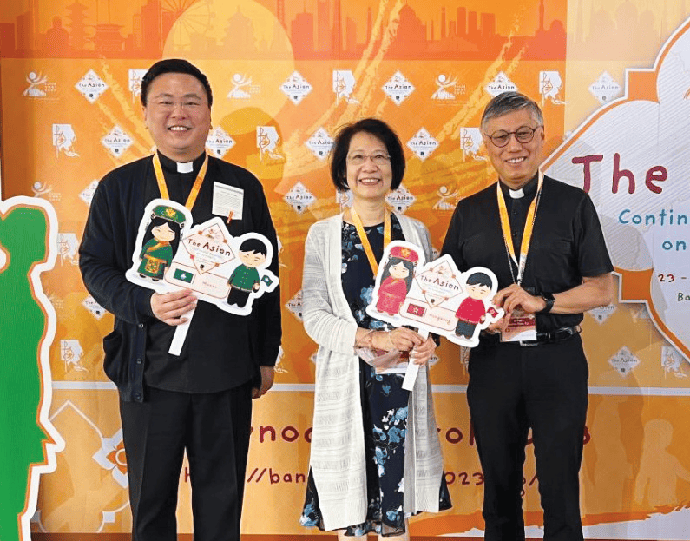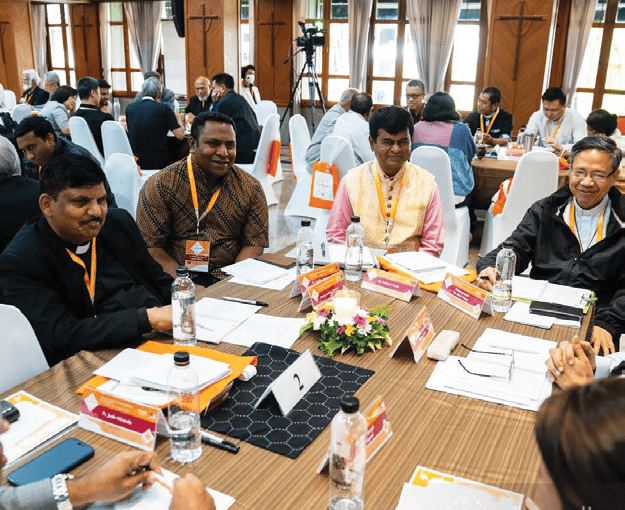
The center of pastoral formation of the Archdiocese of Bangkok (Thailand) is called Baan Phu Waan, literally meaning “the place where seeds are sown.” It’s a beautiful place. About eighty people participated at the Asian Continental Assembly on Synodality that took place from February 24-26, 2023.
Vanessa Siu-Wai Cheng, a focolarina from Hong Kong, fills us in on this new continental phase of the Synodal Path in Asia, a pathway that, as the Metropolitan Archbishop of Tokyo (Japan) Tarcisius Isao Kikuchi said in his opening homily: “It is not only a passing event to be celebrated, but rather a change of attitude of the entire people of God so as to make synodality the founding nature of the Church.”
Vanessa, can you give us an idea of the wide range of participants in this Continental Assembly? What did you speak about?
Seventeen Episcopal Conferences and two Synods of Eastern Rite Churches representing the 29 countries of the FABC (Federation of Asian Bishops’ Conferences) sent their representatives to this event, which aimed to give the Asian Churches the opportunity to discuss the way leading to the Synod as Pope Francis has outlined. We were able to share our experiences by focusing on several issues and some challenges afflicting our continent. We spoke about synodality, decision-making, vocations to the priesthood, the role of young people, poverty, religious conflicts and clericalism, with the hope of proceeding together on a true path of communitarian growth. We were delighted to have representatives of the Synod Secretariat, the Commission, and the Task Force. The wide participation indicated the willingness of the universal Church to engage in the synodal process.
What was the working methodology?
They were three intense days of communion and group work. The methodology was always that of spiritual conversation. The various inputs we received were very important and stimulating. First of all, Cardinal Mario Grech, Secretary General of the Synod of Bishops, brought us the Pope’s warm greetings and assured us that we have not been forgotten. He emphasized that a synodal Church is a Church that listens and discerns. The success of the synodal process depends on the participation of the people of God and the shepherds of the Church. We must be very attentive to voices, especially those that challenge the Church.
What struck you in particular?

A very strong impression from the first day was to see that at every table where a group worked there was an empty chair, representing those who cannot lend their voice and those who do not want to give it. In the center of the table, there was a candle surrounded by a wreath of beautiful flowers that was lit at the beginning of the day as a symbol of the light of the Holy Spirit, which is necessary to make discernment. We experienced conversion in listening to the others, emptying ourselves, all together: cardinals, bishops, priests, religious and lay people. It was a moment to dig deep, to leave the details to be able to reach, with a broad vision, the continental level. The transformation from the “I” to the “we” took place. In addition, it must be said that Asia is home to many religions, including the most ancient, and one of the characteristics of Asians is that of spirituality and prayer. The program included 10 minutes of silence during the discussion of a topic and half an hour of prayer in the chapel between two discernment sessions. These moments of silence and prayer really helped all participants to be with God and in God, to hear His voice both individually and collectively.
What do you think is the biggest challenge of the Church in Asia?
It was wonderful to be together as a Continental Church contemplating the complexity of different as well as common characteristics and challenges. On the first day, I thought it was a bit ambitious to think that, in three days, we could produce a draft that could contribute to the formulation of the working document for the Synod, indicating precise priorities for the Asian continent, but we felt that the Spirit was blowing strongly. Thanks to the work of a drafting group that prepared a “framework” to save us time to read all the reports again from the beginning, we were able to work calmly and with a well-ordered text. The last draft of the document expresses a single symphony with many voices that echo the dreams, hopes, aspirations and suffering of the Asian continent.
Maria Grazia Berretta




